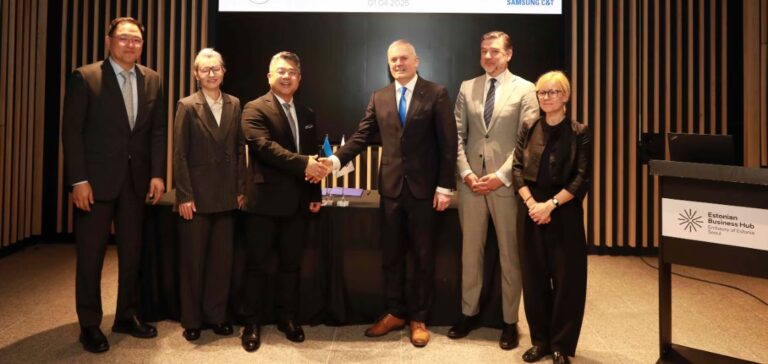Fermi Energia, an Estonian company focused on nuclear energy development, signed a partnership agreement on 1 April in Seoul with Samsung C&T Corporation Engineering & Construction Group to deploy two BWRX-300 modular reactors. The agreement formalises their collaboration on key phases of the project, including Engineering, Procurement, and Construction (EPC), cost estimation, site constructability assessment, and financing strategies. Samsung C&T is now positioned as a strategic commercial partner and potential main contractor for the project.
Gradual deployment and regulatory coordination
The partnership follows a memorandum of understanding signed in November 2024. The two companies will jointly work during the preliminary Front-End Engineering Design (pre-FEED) phase to define project terms and initial budget estimates. The agreement also outlines the launch of a full Front-End Engineering Design (FEED) phase, an essential step for securing regulatory approvals and initiating construction. Large-scale business procedures could begin as early as the second half of 2025.
Regional outlook and market ambitions
Samsung C&T plans to extend its involvement to around ten similar projects across Northern Europe, aiming to leverage economies of scale and reduce associated risks. The South Korean group intends to consolidate its global position in the small modular reactor sector.
Regulatory framework and local progress
In Estonia, nuclear development has progressed since 2019, when Fermi Energia launched a feasibility study on integrating Small Modular Reactors (SMRs) into the national energy mix. In February 2023, the company selected the BWRX-300 model designed by GE Hitachi Nuclear Energy, with a capacity of 300 MWe, water-cooled using natural circulation, and equipped with passive safety systems.
Operational deployment planned for 2035
Fermi Energia submitted a request in January to Estonia’s Ministry of Economic Affairs and Communications to launch the spatial planning process for a 600 MW nuclear power plant. The municipalities of Viru-Nigula and Lüganuse officially agreed to participate in the process in September 2023 and March 2024, respectively. The company expects to submit a construction permit application in 2029, with construction planned to begin in 2031. The first unit is scheduled to be operational by the second half of 2035.






















